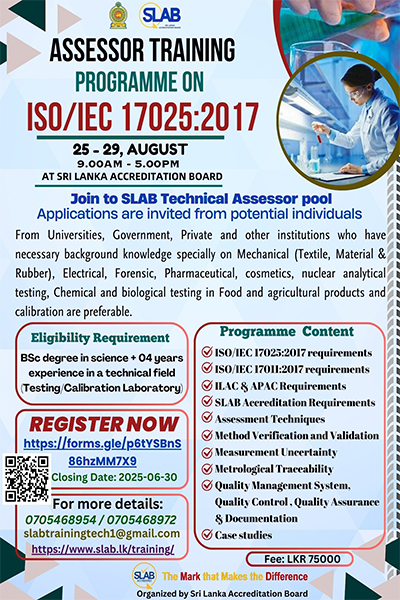
As a response to the growing international demand on environmental wellbeing, the Sri Lanka Accreditation Board (SLAB) has launched the Accreditation Scheme for Validation and Verification and has granted internationally recognized accreditation to validation and verification bodies since 2016 as the South Asian region’s first accreditation body to achieve Multilateral Recognition Arrangement (MLA) status. Multi-Lateral Recognition where signatories recognize each other’s recognition as equivalent. Currently, SLAB provides accreditation for the Validation Verification schemes for national and international Validation and Verification Bodies(V/VBs).
The Validation Verification scheme is in accordance with ISO/IEC 17029: 2019, “General Principles and Requirements for Validation and Verification Bodies” which specified the accreditation criteria for use in Accreditation or other Forms of Recognition.
ISO/IEC 17029 requires the identification of the object of validation and/or verification (“the claim”) as well as the applicable validation and/or verification (the “program”). These include statements on the environmental performance of products and organization, sustainability reports, comparative statements, ethical statements etc.
Validation and verification body’s services will be evaluated as per ISO/IEC 17029:2019, ISO 14065:2013/2020 and relevant mandatory requirement published by IAF or as per any program(s) or scheme(s). Upcoming specific program(s) or scheme(s) and relevant standards or requirements related to Validation and Verification will be adopted by SLAB as per the evolving demand.
With the current demand, SLAB has expanded its scheme requirements to cover emerging validation and verification schemes such as Greenhouse gas emissions, verification of the Carbon Footprint of Products, ICAO -CORSIA, Gold Standard for Global Goals, and VERRA schemes.
- Greenhouse gas validation /Verification ISO 14065
ISO 14065:2020 is a sector specific application of ISO/IEC 17029:2019. ISO 14065 defines principles and requirements for bodies that validate and verify environmental information statements and ISO 14064-3 defines principles and requirements for conducting GHG emissions validation and verification engagements. As an example, Green House Gas emission validation and verification (according to ISO 14064-1:2018, ISO 14064-2:2019, ISO 14064-3:2019 and ISO 14066:2011/2023) is based on ISO 14065:2020.
The SLAB ISO 14065 program provides services for programme owners, regulators and accreditation bodies with a basis for assessing and recognizing the competence of validation and verification bodies.
- The “Carbon Offsetting and Reduction Scheme for International Aviation” (CORSIA)
initiated by the International Civil Aviation Organization (ICAO), is a voluntary market-based scheme to address annual increases in total CO2 emissions from the international civil aviation sector.
-
- Link with ICAO Web site:
Carbon Offsetting and Reduction Scheme for International Aviation (CORSIA)
- Link with ICAO Web site:
- VERRA -Verified Carbone standards (VCS) scheme
The VCS Program is the world’s most widely used voluntary GHG program. The work of the VCS Program is to ensure the credibility of emission reduction projects.
-
- Link with VERRA Web site:
VERIFIED CARBON STANDARD
- Link with VERRA Web site:
- The ISO 14067 :2018 scheme
specifies principles, requirements, and guidelines for the quantification and communication of the carbon footprint of products (CFPS), including goods and services, covering GHG emissions and removals over the life cycle of a product. This is the international standard that bases the footprint calculation on the life cycle analysis.
- Gold Standard for Global Goals:
The Gold Standard trademark has always been associated with promoting both climate mitigation and impacts on sustainable development. We have designed our standard to guarantee that climate action also contributes to the Sustainable Development Goals in a meaningful and measurable way in light of the ambitious 2030 Agenda.
- Link with GS Web site:
Gold Standard for the Global Goals
Validation and Verification as Conformity Assessment Activity
- Confirmation of reliability of information declared in claims.
- Increased confidence to stakeholders and parties interested in the claims.
- Assures on competence.
- Widened recognition.
- Ensures impartiality.



